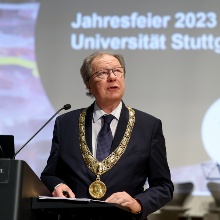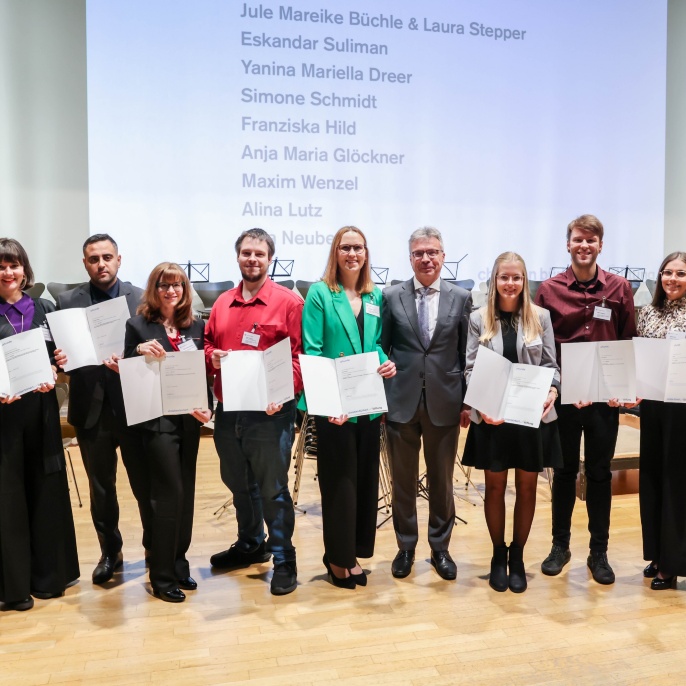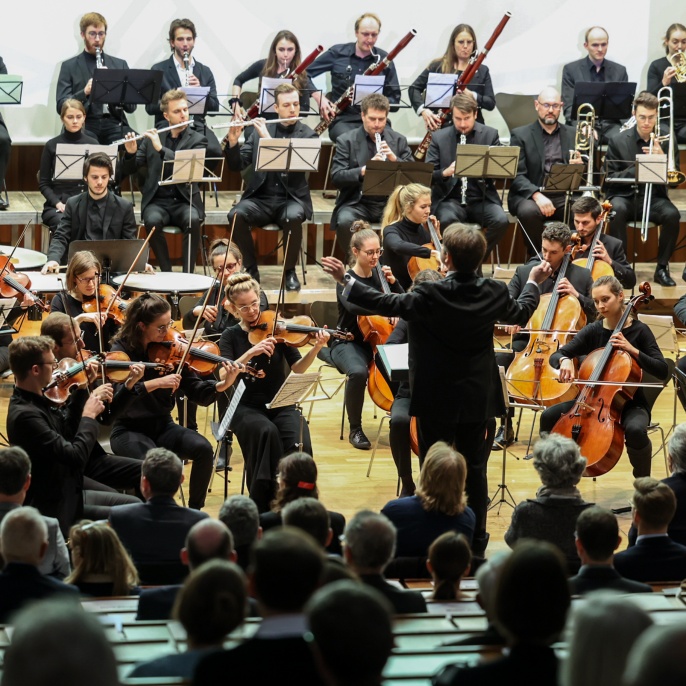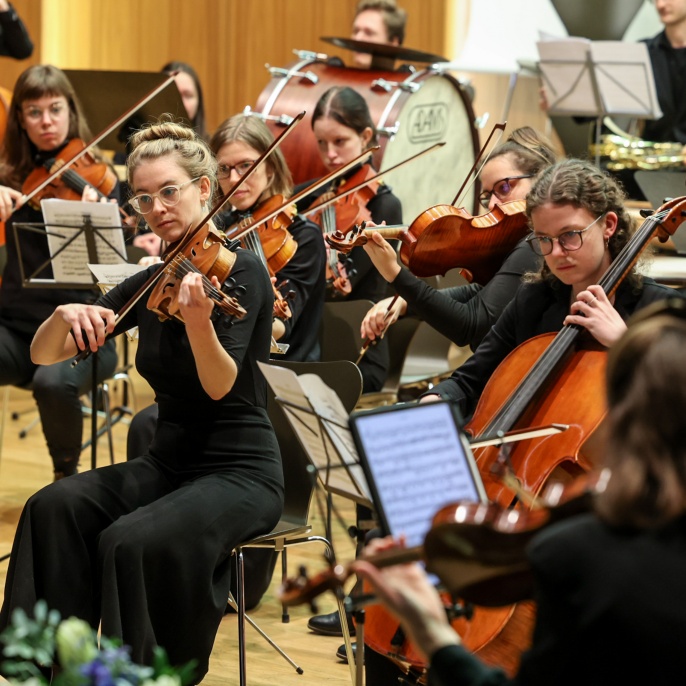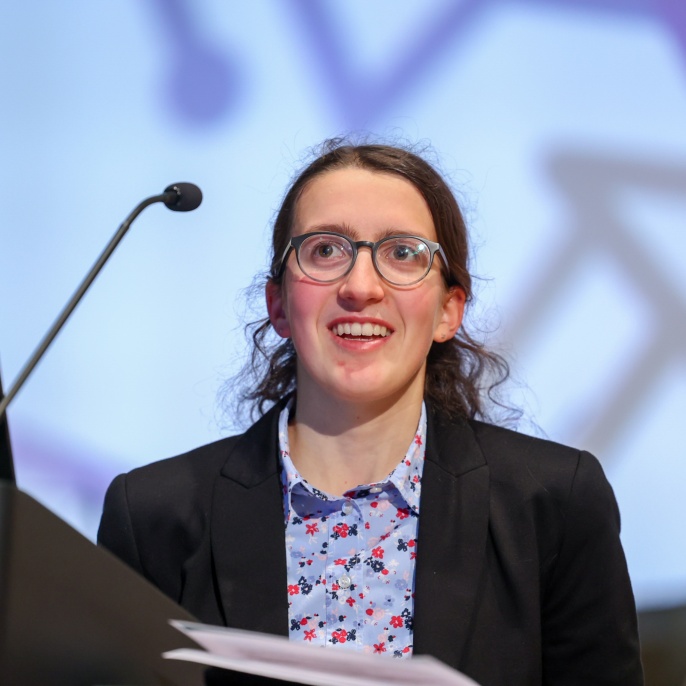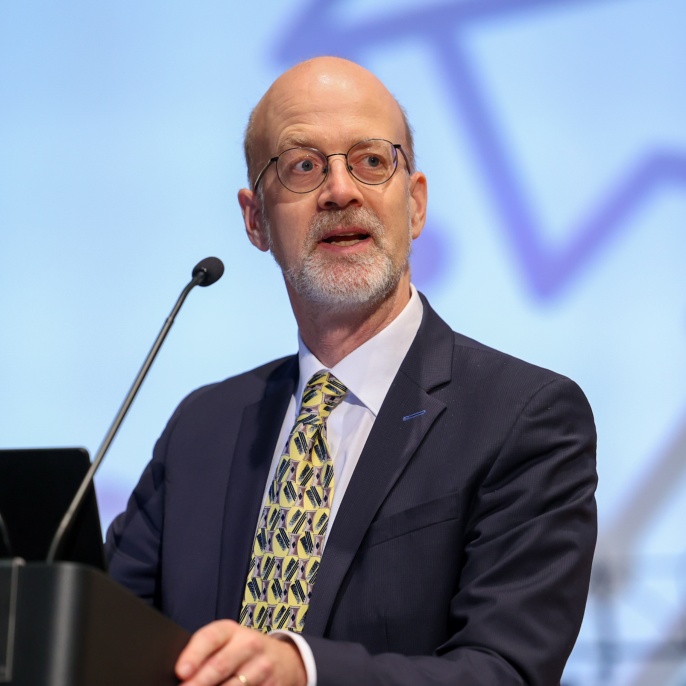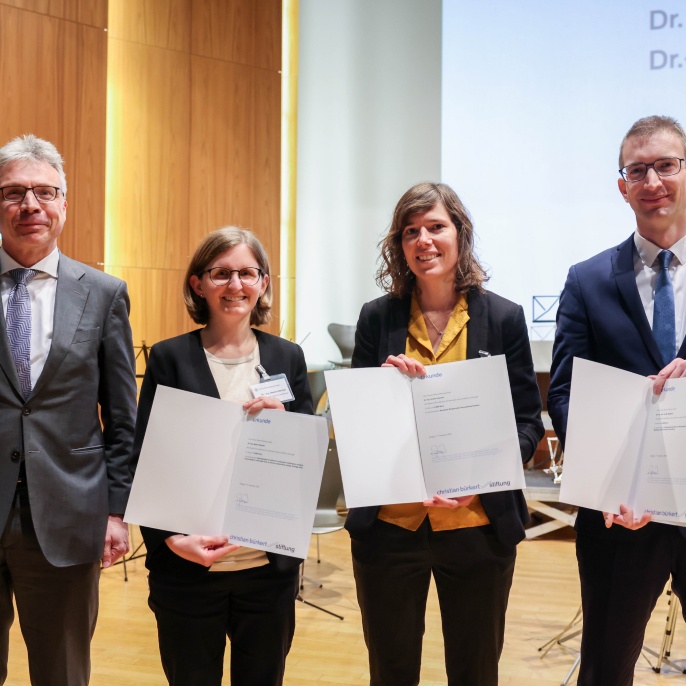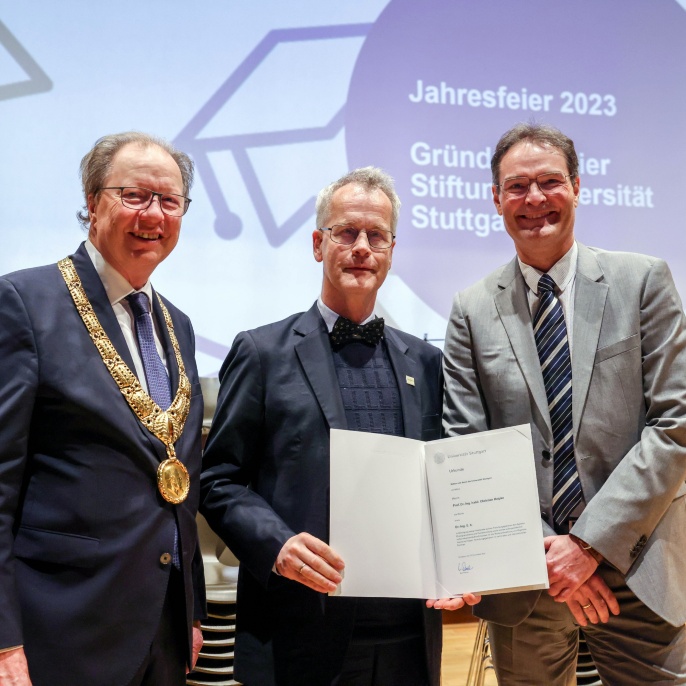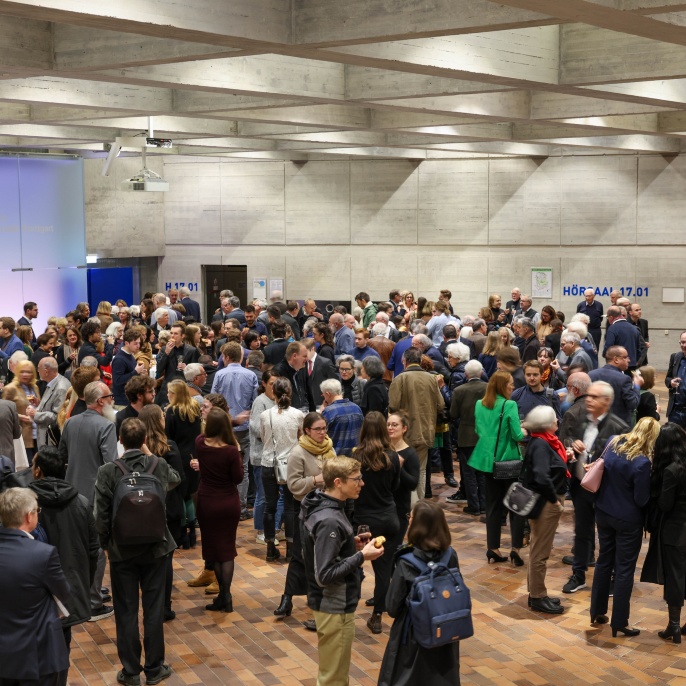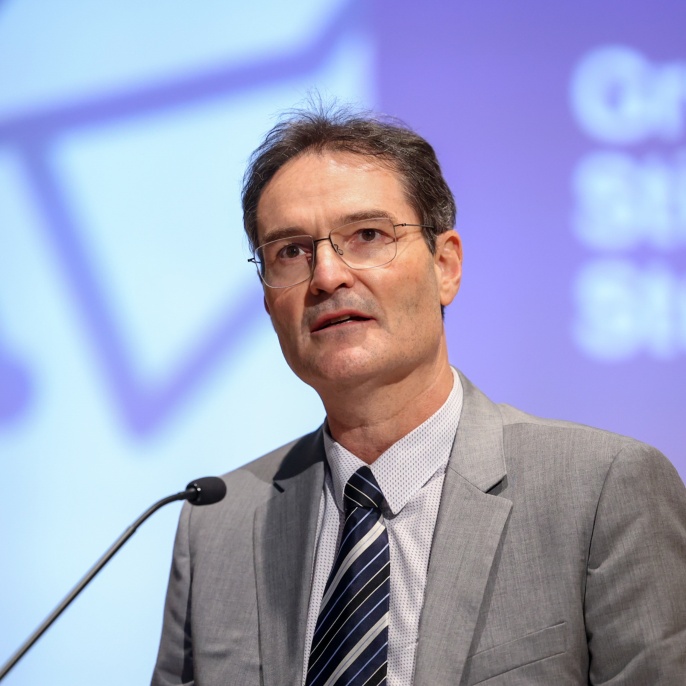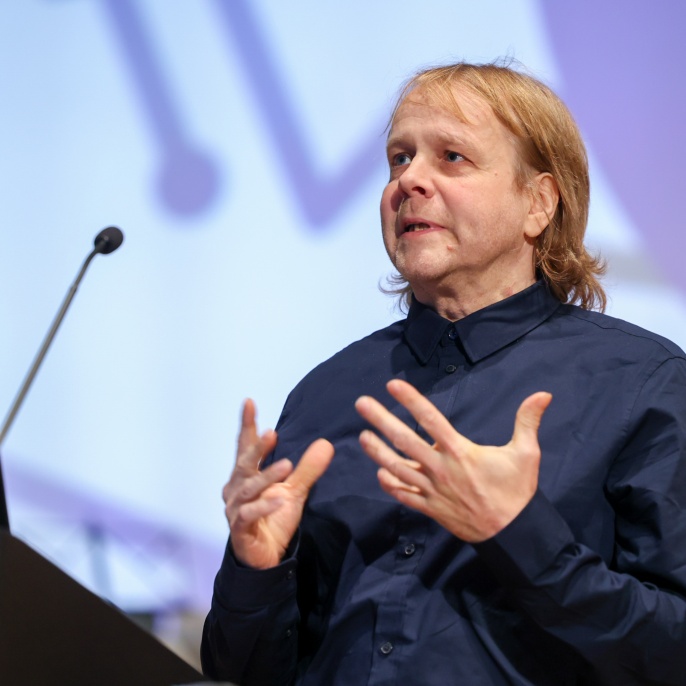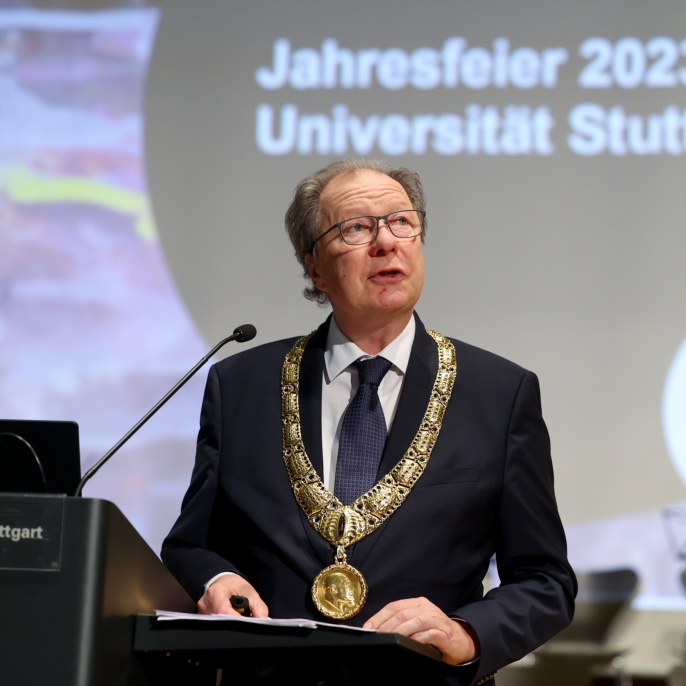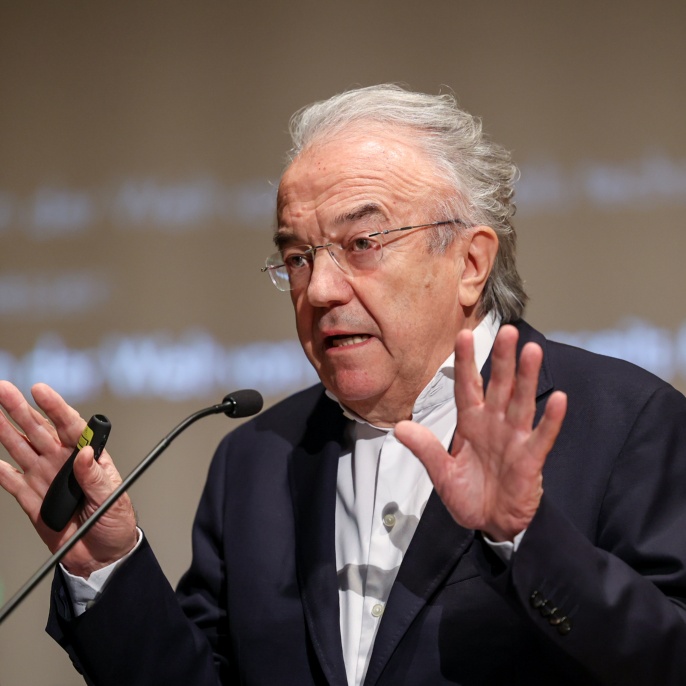"Nice from up here ... however, if one looks a bit closer, there is still a lot to do." At the start of the anniversary celebrations, the Rector, Professor Wolfram Ressel, quoted from a video for the new central university foundation produced by a young team from the Baden-Württemberg Film Academy. This short sentence, Ressel said, summed up the complex background to the establishment of the foundation, because, he said, not only should the "University of Stuttgart Foundation" continue the extremely successful work of the Vereinigung von Freunden der Universität Stuttgart e. V. (VFUS), but should also expand upon it with a "significantly higher degree of impact and vigor. The University of Stuttgart Foundation, he added, will boost our public image, further expand our networks and links to alumni and industry and also take our procurement of funding to a new level".
Foundation continues century-old investment in research, teaching, and education
The VFUS, which was founded exactly one hundred years ago, cultivated the University of Stuttgart's close ties to industry as well as supporting research, teaching, and education in a variety of ways including the Deutschlandstipendium scholarship for high-achieving students, the Studium Generale (extracurricular studies), and the university's Academic Choir and Academic Orchestra. The new foundation, Ressel said, would continue these and other selected VFUS funding measures. "However," he added, "we also want to enable and conceptualize further funding for everything from excellence in research and teaching to infrastructure projects." Another goal of the new foundation is to strengthen Baden-Württemberg as a center of science and business by contributing to a reliable supply of resources on the one hand and securing sustainable funding for the tasks and activities carried out by the University of Stuttgart on the other.
The Rector made particular mention of long-time VFUS supporter Dr Volkmar Denner as one of the initiators of the University of Stuttgart Foundation. He also thanked the Stihl family, the Vector Foundation, and the Christian Bürkert Foundation for their "generous contributions to the Foundation's capital stock". The VFUS's former members, who are co-founders alongside the university itself, also made a significant contribution. Ressel also encouraged all those present to make a commitment and financial contribution to the University of Stuttgart Foundation saying that: "Only together will be able to achieve great things!"
Stuttgart milestones in research
In summing up, the Rector then highlighted some of the research highlights of the past academic year, including special research areas on visual computing and more environmentally friendly air transport, a new research training group focusing on mixed ion-electron transport, and a Carl Zeiss Foundation research project aimed at transforming the energy supply and the state-funded Innovation Campus, which concentrates on quantum technology and the transport of the future. Ressel expressed his delight that researchers from the University of Stuttgart had been honored with important prizes across all disciplines. Professor Achim Menges, for example, was the first architect in the history of the Federal Republic of Germany to receive the Leibniz Prize. Professor Dieter Schmalstieg, an expert in virtual and augmented reality, was awarded an Alexander von Humboldt Professorship, while junior philosophy professor Amrei Bahr received the Communicator Award from the German Research Foundation and the Stifterverband.
Ressel said that he was especially pleased with the " extremely positive developments" in external funding, which amounted to over 287,000,000 euros in 2022, and will be even higher in the current year: 50 percent of the university's total budget is now provided through external funds, he said. "Not many German universities can match that." However, he went on to say, the significant drop in student numbers in STEM subjects, particularly in engineering, was a cause for concern. According to Ressel, this development should be countered by improved marketing and faster enrollment procedures, among other things.
Building on successes together
The University of Stuttgart will once again be submitting several cluster applications to the Federal and State Governments' Excellence Strategy next year. As Professor Bernhard Keimer, Chairman of the University Council, said in his welcoming address, the applications from various faculties represented "the entire diversity of the university. "We await the results of the review in great anticipation." Keimer also highlighted Anna Steiger's election as the new Chancellor and Professor Michael Liebendörfer as the new Vice-Rector for Teaching and Continuing Education in July 2023. Norbert Röhrl, representing the mid-level faculty, and student representative Anna Dannecker expressed their initial thoughts on how best to utilize the foundation funding in their opening speeches: Röhrl called for further progress to be made with the university's internal digitalization, and Dannecker spoke of "more than necessary" infrastructure funding for the university library, to which there has only been limited access since a smoldering fire in August. Dannecker expressed her enthusiasm for successful student events such as the induction weeks for first-semester students, which have finally been able to take place again since October 2022. The stuvus student council also celebrated its tenth anniversary in July 2023 with a program lasting several days.
Sobek's keynote speech: future construction technologies
Professor Emeritus Werner Sobek, a pioneer of lightweight construction and sustainable building, delivered a keynote speech entitled "Building in tomorrow's world, beyond technological wishful thinking". Architectural creation, he said, means designing the homes today that humans will inhabit in the near future. "Searching for utopias in the best sense of the word!" Sobek, a civil engineer and architect, began by talking about the immense threat posed by climate change, which could lead to a large part of the world becoming uninhabitable in just a few decades. Whereas we all understand the causes of climate change and its immediate effects, not many people have yet realized the consequences, including crop failures, famine and mass climate migration. Conventional construction techniques were responsible for 60 per cent of resource consumption and around 50 per cent of all climate-damaging emissions worldwide, Sobek continued. Constructing housing to Western standards for the ten billion people who will be living on the planet in 2050 was simply impossible he went on to say and would require the use of several thousand tons of resources every second.
Using a range of photos of innovative lightweight structures and building materials developed at the Institute for Lightweight Structures and Conceptual Design (ILEK), which Sobek founded, he illustrated that the technical components of ecologically sustainable construction are already available: "The University of Stuttgart,” he said, “is a world leader in building technology that uses less material for more people." Resource savings of up to 80 percent are possible. The University of Stuttgart's innovative solutions range from the use of regional building materials and new recycling technologies to adaptive structures, which are the only ones of their kind in the world to adjust to shifting weight loads.
Yet technology alone is not enough to tackle the problems of the future, as Sobek emphasized, as he explained the word "beyond" in the title of his presentation: what we require, he said, is a thoroughgoing societal agreement on goals and priorities in which context, he also referred to the "immense consumption of materials" for thermal insulation and the fact that the construction of any given building causes far more CO2 emissions than heating it later.
Honorary doctorate for Christian Heipke
This was followed by the award of an honorary doctorate to Professor Christian Heipke from Leibniz University Hanover for his services to digital photogrammetry and remote sensing, his impressive voluntary commitment to the continued development of organizations in these research areas, and his close ties with the University of Stuttgart.
Following the presentation of the Bürkert University Prizes, the University of Stuttgart's Academic Orchestra, which was conducted by Mihály Zeke, played a spirited version of the "Academic Festival Overture" by Johannes Brahms, who composed the piece, which references a number of songs traditionally sung by German students, after receiving an honorary doctorate from the University of Breslau in 1880; a fitting musical finale to the anniversary celebrations.


